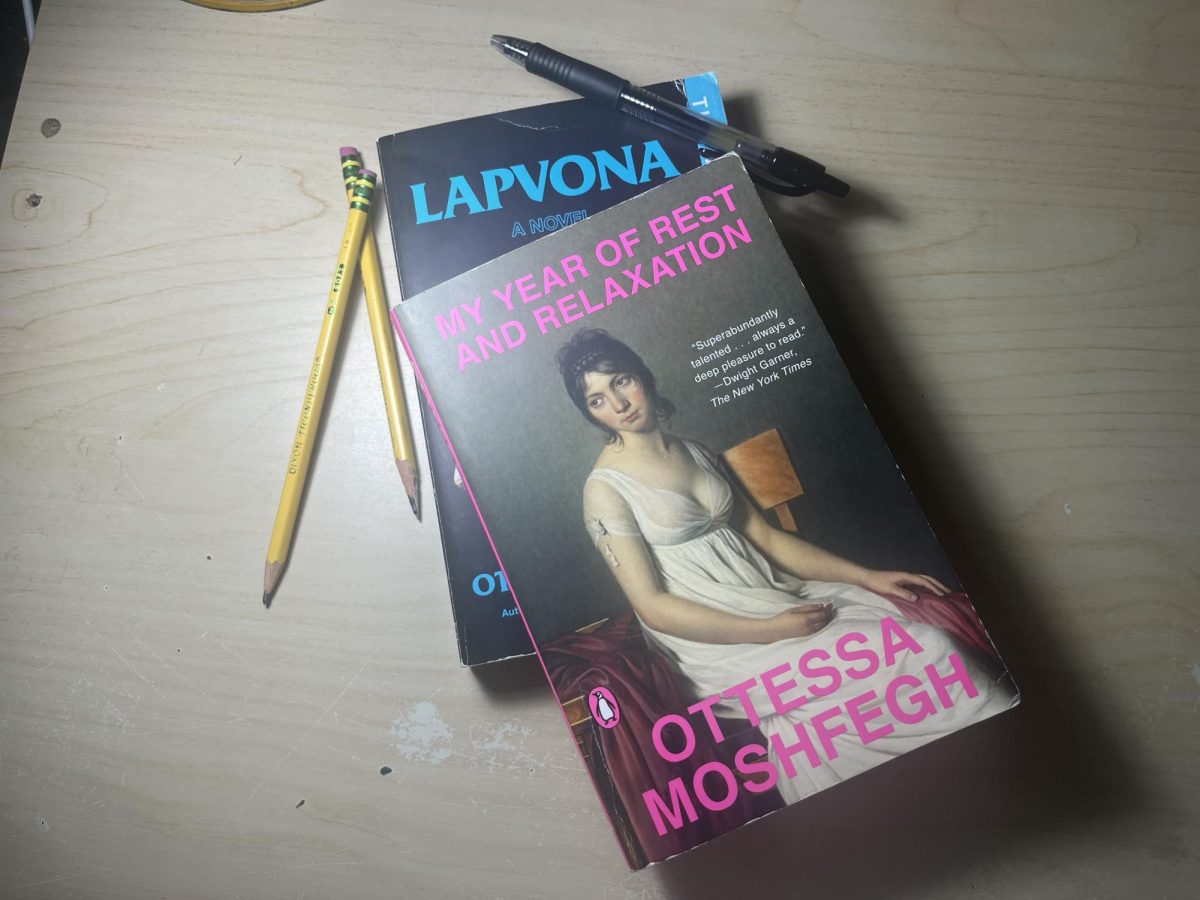*Spoilers are present, so proceed with caution.
Ottessa Moshfegh is an American author and novelist, based in New England. Her first novel was Eileen published 2015, and according to her About the Author page on Penguin Random House, she “won the PEN/Hemingway Award for debut fiction.” Other than Eileen, she has written Lapvona, McGlue, My Year of Rest and Relaxation, Homesick for Another World, and Death in Her Hands.
My Year of Rest and Relaxation is a 2018 novel about the uncomfortable realities of what is important in life. The synopsis on the back describes the book as, “a novel about a young woman’s efforts to duck the ills of the world by embarking on an extended hibernation with the help of one of the worst psychiatrists.”
The story itself was an interesting premise about a young woman in New York around 2001. Although she was beautiful and had made it out of art school, she remained unhappy with her life as it was in the city. The novel follows her as her psychiatric drug use intensifies and she ends up in a ‘year of rest and relaxation.’
The book has an incredibly interesting story made better with Moshfegh’s captivating writing style. The unnamed narrator takes the reader through her first person thoughts and feelings about her current life. The highlight of Moshfegh’s writing is her incredible use of vocabulary while keeping the ease of the reading; however, the story subjects the reader to disturbing themes involving sexuality, drug use, and mental health issues.
The ending was the most compelling part of this novel, seeing as this is so, there will be spoilers in this paragraph. The narrator’s somewhat successful metamorphosis into a semi-functioning woman was a surprising jump from what was expected after her isolation. However, this is not necessarily a pro in the grand scheme of things because it may seem to the audience that the use of psychiatric drugs on an incredibly extreme level to better oneself works. According to American Addiction Centers, 48.5 million Americans “battled a substance use disorder in the past year.” Seeing as this is a large problem, it does not seem helpful to frame the narrator’s intense drug use as a positive experience.
The second important Moshfegh book is Lapvona, published in 2022, is Moshfegh’s most recent novel focusing on a young boy’s experience in a medieval European village. The lord of the town is corrupt, and the boy, Marek, is slowly introduced into corrupt royalty until he too is a part of the rulers ruining his small town.
Once again, Moshfegh’s skillful writing is what carries the reader through this book. She continues with her trademark of incredibly disturbing themes that come up right when the reader least expects it, leading to a somewhat exciting read.
As interesting as this book was, it felt like walking a strange tightrope between reality and fantasy. There were no dragons or ogres that Marek had to defeat, but he did have to face real life monsters, creeps and perverts. Moshfegh combines subjects that feel real, like the setting of medieval Europe and a corrupt lord, with subjects that are just freaky enough to get your heart racing. And the delivery of the lines are innocent enough to make the reader feel a bit too uncomfortable.
A main criticism for both of these books, but especially Lapvona, is its grossness. Moshfegh has no problem writing about abhorrent and disturbing subjects in these books, which may be both a criticism and a compliment. She deals with very sexual and generally inappropriate subjects, but writes them in a way that is somewhat digestible for the reader. It is hard to read about what the main character, Marek, is facing, but is also fascinating in an incredibly disturbing way.
Contrary to My Year of Rest and Relaxation, Lapvona follows a more fantasy-style of writing. It seems more reasonable to push the boundaries of this setting. Whereas with My Year of Rest and Relaxation, there is a limit to what readers can imagine, as the years of 2000 and 2001 aren’t so far back, there is not much fantasy to it’s reality.
After reading both books, they feel very similar yet different. The writing style of both were incredibly captivating, keeping the reader hooked on every word. Even with disturbing subject matter, the way that Moshfegh works around it with her masterful storytelling creates a storyline that is easily followed where the reader can still continue through the grit. If you are sensitive as a reader to subjects mentioned in this article, it would not be recommended to read these two books. However, with a strong stomach, these books are worth the read and will leave much to be pondered over.

